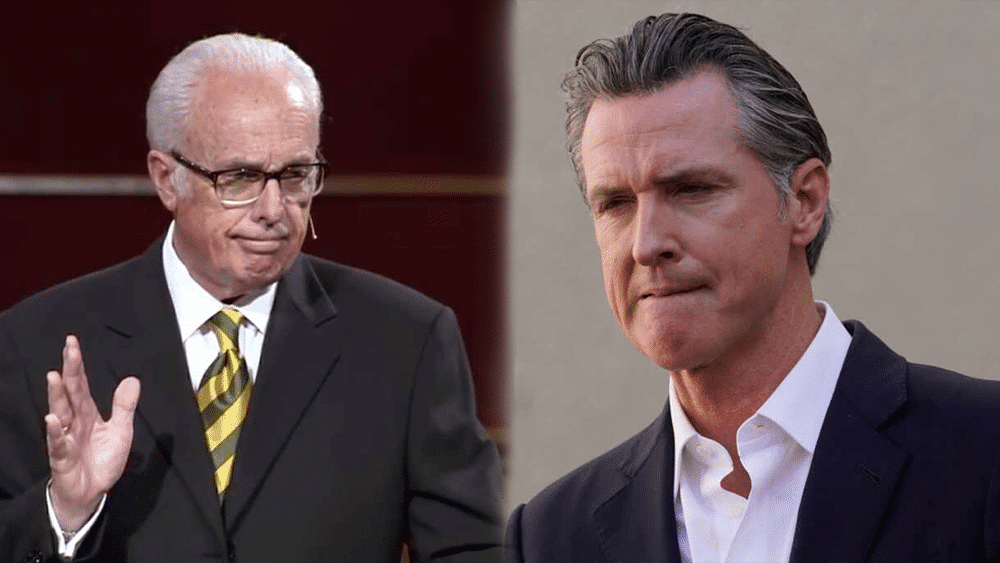Governor Gavin Newsom of California has made headlines over the past two decades for advancing increasingly evil policies while in public office.
In 2004, while serving as mayor of San Francisco, he directed the city to issue marriage licenses for same-sex couples in violation of state law. In 2020, he enforced the shuttering of local churches through his aggressive lockdown order. And last month, he sponsored billboards in multiple conservative states inviting women to seek abortions in California—even daring to quote Jesus’ words about loving one’s neighbor (Mark 12:31) on some of the advertisements.
For nearly as long as Gavin Newsom has been alive, Pastor John MacArthur has taught and preached at Grace Community Church in Sun Valley, California. At the close of a recent service, MacArthur grieved that Newsom had crossed a new line with his abortion billboards—provoking a newfound desire within the eighty-three-year-old minister’s heart to see him redeemed from his sins. Beyond a longing to see God’s name hallowed (Matthew 6:9), the appeal from MacArthur was driven by an evident compassion for the lost (Matthew 9:36).
“You chose words from the lips of Jesus without admitting that in the same moment He gave the greatest commandment,” MacArthur wrote in an open letter to the Democratic official. “You cannot love God as He commands while aiding in the murder of His image-bearers.”
Filled with biblical witness regarding God’s commandments for the civil magistrates to reward the one who does good and bear the sword against the one who does evil (Romans 13:1–7, Psalm 72:11, Proverbs 16:12), the letter specifically mentioned Newsom’s abuses—such as promoting “sexual perversions” like homosexuality and transgenderism while aiding the “butchering” of preborn babies through abortion—without pulling a single punch.
Then, without minimizing the abhorrent nature of forwarding such inequities as a civil magistrate, MacArthur made an earnest plea for Newsom’s soul.
“There is salvation for those who repent. Christ purchased full redemption for all who will turn from wickedness, forsake their evil thoughts and actions, and trust fully in Him as Lord and Savior,” MacArthur continued. “Our church, and countless Christians nationwide, are praying for your full repentance. Please respond to the gospel, forsake the path of wickedness you have pursued all your life, turn to Christ, ask for forgiveness, and use your office to advance the cause of righteousness.”
MacArthur stands in a long heritage of believers who have prayed for kings and rulers (1 Timothy 2:1–4) while offering prophetic witness regarding the state’s authority as derived from the Creator (Romans 13:1). Moses reminded Pharaoh that “the earth is the LORD’s” (Exodus 9:29). Isaiah proclaimed to Cyrus, who had not yet been born, that he would be raised to power such that “people may know, from the rising of the sun and from the west, that there is none besides Me” (Isaiah 45:6). John the Baptist exhorted Herod that it was “not lawful” for him to have his brother’s wife (Matthew 14:3). Though they were exiled, sawn in half, and beheaded, such men did not hesitate to list their leaders’ sins against heaven and call them to obey “the blessed and only Sovereign” (1 Timothy 6:15).
Modern evangelicals, on the other hand, wrongly believe that church and state presiding over separate spheres means that the latter need not submit to the definitions of good and evil enumerated by God (Romans 13:1–7). The political leadership of the United States boastfully takes “counsel together against the LORD and against his Anointed, saying, ‘Let us burst their bonds apart and cast away their cords from us’” (Psalm 2:3). Meanwhile, professing evangelicals either have no issue with the scorning of their Lord or find themselves cowardly avoiding an admonishment of their leaders. “Kiss the Son, lest He be angry, and you perish in the way, for His wrath is quickly kindled” (Psalm 2:12).
Take, for example, Trevin Wax’s recent article in The Gospel Coalition, which contended that pastors mingling politics with morality constitutes the new “seeker sensitivity” movement. While he rightly recognizes that many pastors satisfy “itching ears” by provoking their congregations to react against the party which they oppose and correctly affirms the need to “speak boldly and prophetically where the Bible is clear,” he fails to note that disagreements over “how best to apply moral principles to political action” often permit the flagrant violations of clear biblical principles—often in favor of the progressivism that has seeped into many church bodies.
On the issue of abortion, some professing Christians label themselves “pro-all-life,” thereby mingling a clarion opposition to child sacrifice with left-wing social causes—such as ending the death penalty or expanding government welfare programs—while the preborn babies left vulnerable to state-sanctioned murder are quickly forgotten. Meanwhile, statism advances under the guise of Christian morality—a third-way approach that itches the ears of progressives who deify the state and bow the knee to Moloch. The outright rejection of clear moral evils—such as abortion, homosexuality, and transgenderism—without giving quarter to unbiblical worldviews ought not to be controversial.
Beyond countless examples throughout the pages of Scripture, two millennia of church history testify against the blunders prevalent in our age.
In his Apology, published around 197, author and polemicist Tertullian wrote to the leaders of the Roman Empire about the necessity of legally tolerating the Christian religion. Tertullian reminded his civil magistrates of their status as creatures made by the Triune God—a reality that our own rulers, who believe themselves and their constituents to be no more than accidental descendants of pond scum, ought to remember.
“Let an emperor make war upon heaven, and pride himself with the thoughts of leading captive heaven in triumph; let him set guards upon heaven, and try to reduce it to a Roman province, and he will find his weakness,” wrote Tertullian. “He is therefore great, because he is but less than heaven; for he is a creature of Him who made heaven and every creature that ever had a being. He made him an emperor who made him a man; the Author of his life is the Author of his power.”
As David offered deep respect to wicked King Saul (1 Samuel 24:6) even amid great and unjust persecution, Tertullian manifested a profound honor for the authorities God had established. “We reverence the providence of God in the persons of the emperors, who has made choice of them for the government of the world. We know that the power they have, they have by the will of God; and therefore we wish well to that which God has willed to be and we look upon that as a very sacred oath which is made by so sacred a person.”
In 1558, reformer John Knox wrote in his Appellation to the nobility and estates of Scotland that they had a duty to obey God rather than any chief magistrates who disobeyed Him. “For hereof I would your honors were most certainly persuaded, that God will neither excuse nobility nor people,” he explained, “but the nobility least of all, that obey and follow their kings in manifest iniquity; but with the same vengeance will God punish the prince, people, and nobility, conspiring together against Him and His holy ordinances; as in the punishment taken upon Pharaoh, Israel, Judah, and Babylon is evidently to be seen.”
From the example of the prophets, the apostles, the church fathers, the reformers, and contemporary ministers like MacArthur who love the Lord and suffer to see Him profaned (Exodus 20:7), we ought to be reminded that the reign of Christ is not limited to daily devotions or Sunday morning worship within the four walls of the church. Though the state and its management of civil justice is rightly distinct from the church and its administration of word and sacrament, government leadership must constantly be reminded—for the good of their own souls and the image-bearers over whom they preside—that they must one day give an account to the God who created them and established the seat of their power. Without the perfect righteousness of Jesus Christ covering their sins, “the smoke of their torment goes up forever and ever, and they have no rest, day or night” (Revelation 14:11).
Government leadership must constantly be reminded that they must one day give an account to the God who created them and established the seat of their power.
Need we be reminded that even demon-worshiping King Manasseh “entreated the favor of the LORD his God and humbled himself greatly before the God of his fathers” before his death (2 Chronicles 33:12)? Need we be reminded that the entire city of Nineveh repented on the basis of a few words from a wayward prophet (Jonah 3:4-5)? Need we be reminded that a handful of fishermen and tax collectors “turned the world upside down” with the gospel (Acts 17:6)?
What would happen if American Christians regained their prophetic voice? Rather than offering nothing but mockery toward President Joe Biden and other idolatrous magistrates, what if believers routinely exhorted their local, state, and national leaders to rule with justice and righteousness? What would occur if we extended respect to whom it is owed, prayed for them, and called them to receive the free gift of salvation purchased by the Lord Jesus Christ?
May we work and pray to such ends with great zeal, to the glory of our God and Savior.




